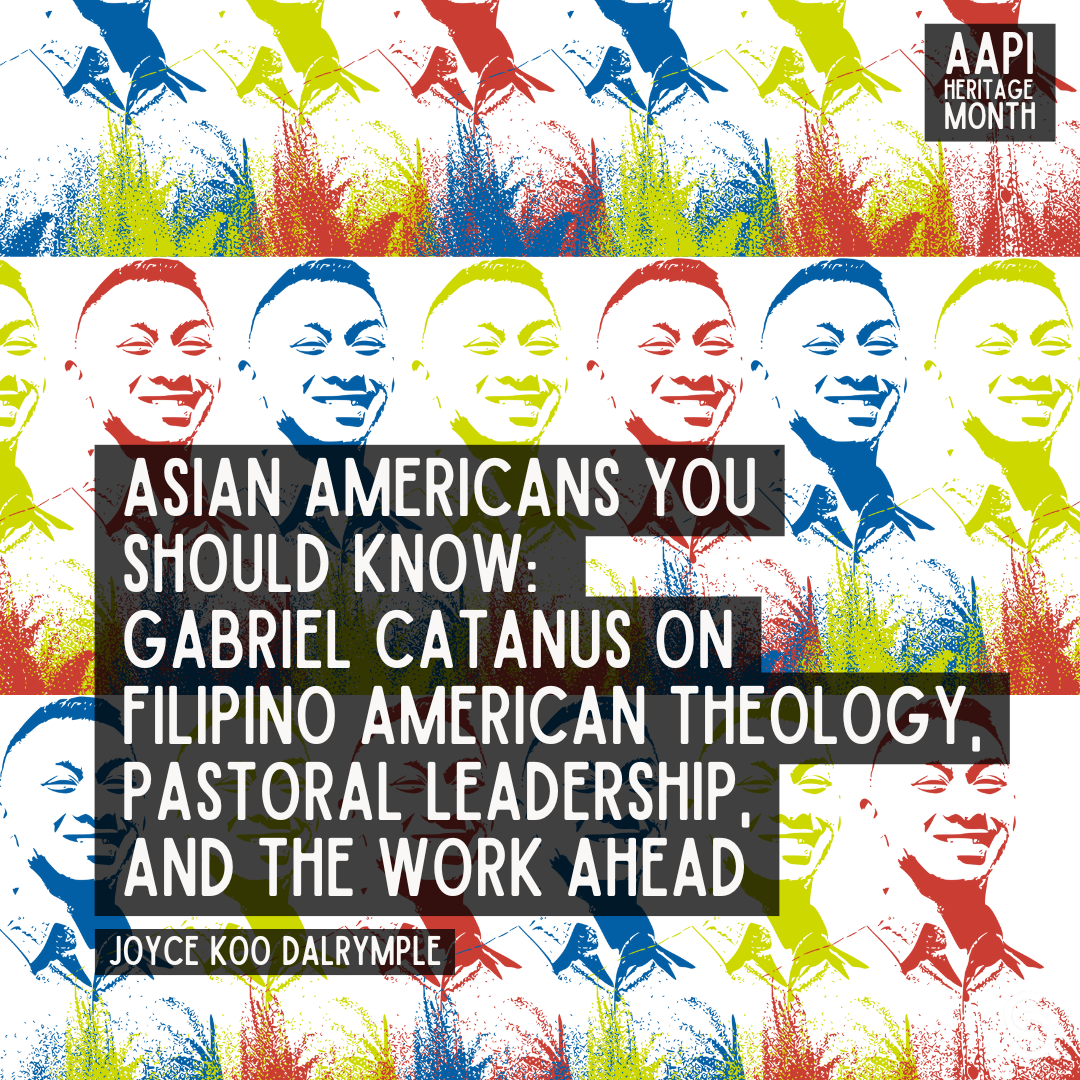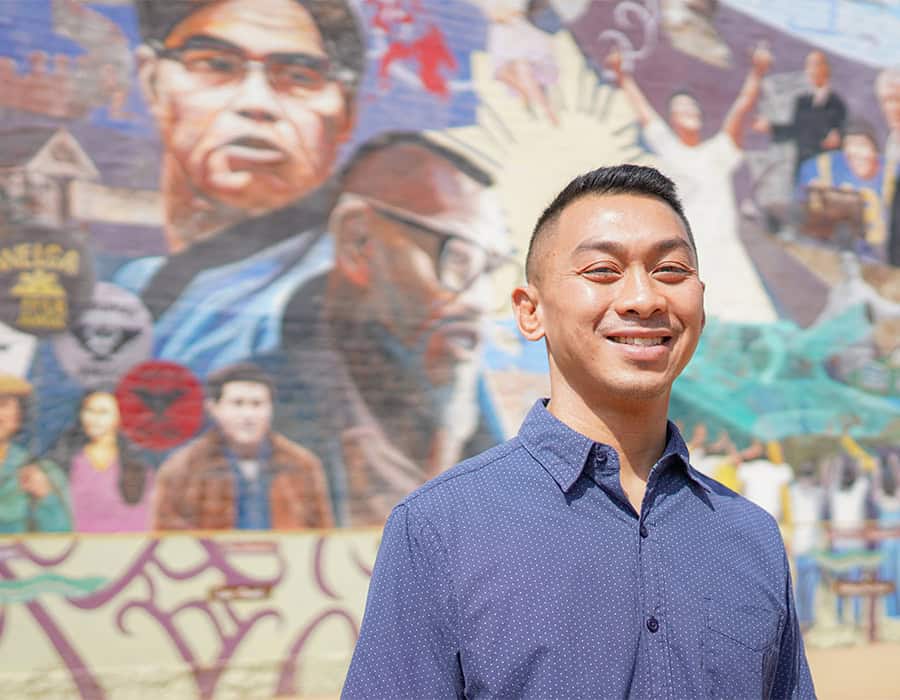 Editor’s note: May is AAPI month, formally known as Asian American, Native Hawaiian, and Pacific Islander Heritage Month. Throughout this month, we are featuring Q&As with some of today’s leading thinkers and activists. We call this series of interviews “Asian Americans You Should Know.” This series was put together by pastor and author Joyce Koo Dalrymple. You can read the first Q&A with Dr. May Young here. Today, we get to know Dr, Gabriel J. Catanus, director of the Filipino American Ministry Initiative (FAMI) at Fuller Theological Seminary. See his fuller bio below.
Editor’s note: May is AAPI month, formally known as Asian American, Native Hawaiian, and Pacific Islander Heritage Month. Throughout this month, we are featuring Q&As with some of today’s leading thinkers and activists. We call this series of interviews “Asian Americans You Should Know.” This series was put together by pastor and author Joyce Koo Dalrymple. You can read the first Q&A with Dr. May Young here. Today, we get to know Dr, Gabriel J. Catanus, director of the Filipino American Ministry Initiative (FAMI) at Fuller Theological Seminary. See his fuller bio below.
Joyce Koo Dalrymple: Was there anything in your experience as an Asian American—or particularly as a Filipino American—that drew you to your area of research in liberation theology?
Dr. Catanus: During seminary (about 20 years ago), I often felt the dissonance between the required readings and professors’ perspectives, and the ways people in my family’s Filipino American and Filipino Canadian churches connected with God and practiced their faith. I had some wonderful Asian American mentors and friends, but by the time I reached my ThM studies, it became clear that if I wanted to see Filipino Americans represented within theological discourse, I would have to start writing myself.
During my PhD coursework, I studied liberation theology with Dr. Miguel Díaz and finally had the opportunity to wrestle with the contextual questions that had been stirring in me for over a decade. I wrote a final paper titled “The Gospel According to Manny Pacquiao,” which I later turned into a blog post—that’s probably the closest I’ll ever come to going viral. The response was overwhelming and opened the door to more writing and speaking opportunities. Thankfully, many other Filipino American voices have joined the conversation since then.
Dalrymple: In seminary, I didn’t read any books by Asian theologians. Why is it important to have Asian or Filipino American theologians?
Dr. Catanus: As a pastor, I lead with the conviction that all of who we are matters to God—our bodies, our stories, our cultures—because God created us with love and desires to see every part of us redeemed and formed into Christlikeness.
Without theologians and pastors who attend to the church in all its complexity, critical parts of our identity—our languages, relationships, ways of knowing and being—remain captive to ideologies that promise freedom but perpetuate disconnection and harm.
So, it’s not just that we need more Asian or Asian American theologians. We need scholars across disciplines who love the church deeply and call it back to the heart of God again and again.
Dalrymple: What are you working on now? What can people look forward to from you?
Dr. Catanus: My primary focus is pastoring Garden City Covenant Church, our wonderfully strange and beautiful congregation in Chicago. As we grow, I’m learning to pray more, trust God more, and pay attention to how my own health affects the quality of my leadership. As a church, we’re discerning how God is calling us to love our city more concretely—even as we hope to multiply and empower more leaders of color and women for mission.
On the academic side, the Filipino American Ministry Initiative (FAMI) at Fuller is growing steadily. Our team is building partnerships with pastors and churches, and I hope this work will reshape the landscape of Filipino American ministry in the years ahead.
I’m currently revising a manuscript on Filipino American Christianity for Cascade Books (Wipf & Stock), as part of an upcoming series on Asian American theology and ministry edited by Daniel Lee (Fuller) and David Chao (Princeton). I also contributed a chapter to a forthcoming Baker Academic book (2025), and a few more projects are in the pipeline.
Dalrymple: What should non-Asian people know about the experience of Asian American or Filipino American theologians?
Dr. Catanus: My response is more of an invitation than a statement of experience: partnering with us will cost you—and it will be worth it.
At this point, I’m no longer interested in being tokenized or helping organizations feel better about their diversity. Because I remain deeply rooted in my community, I don’t have the energy for transactional relationships that prioritize social media optics over long-term trust.
But as a Christian, I still believe in mutual, life-giving partnerships. Few things are more refreshing than servant-leaders who wield power rightly and reflect the beauty of time-tested love and trust.
So if you’re a non-Asian leader, an East Asian American peer, an institution, or a denomination—if you want to walk with the Filipino and Asian Americans I serve—you’ll see God’s Spirit at work. But we’ll know you by your cruciformity.
Dalrymple: Today, a number of Asian Americans are leading evangelical institutions—NAE, InterVarsity, Bread for the World, Lausanne. What do you see Asian Americans contributing in this moment?
Dr. Catanus: I thank God for the good work my Asian American colleagues are doing, and I pray that their labor will bear fruit well beyond their tenures.
That said, I’m hesitant to celebrate too quickly—because most of the leaders in those roles are East Asian American men. Here in Chicago and across the Midwest, Asian American women and Filipino Americans have been deeply wounded in recent years, often by East Asian American pastors involved in spiritual or emotional abuse.
Yes, every leader and context is different, but patterns reflect cultures.
Still, I believe that when our leadership creates space for others—especially those further from institutional power—to flourish and lead, that’s a sign the Holy Spirit is being welcomed in.
Make it so, Lord.
 Gabriel J. Catanus is the director of the Filipino American Ministry Initiative (FAMI) at Fuller Theological Seminary, where he teaches theology and ethics. He is also the pastor of Garden City Covenant Church, a congregation serving immigrant families and young professionals in Chicago. He received his PhD from Loyola University Chicago.
Gabriel J. Catanus is the director of the Filipino American Ministry Initiative (FAMI) at Fuller Theological Seminary, where he teaches theology and ethics. He is also the pastor of Garden City Covenant Church, a congregation serving immigrant families and young professionals in Chicago. He received his PhD from Loyola University Chicago.


